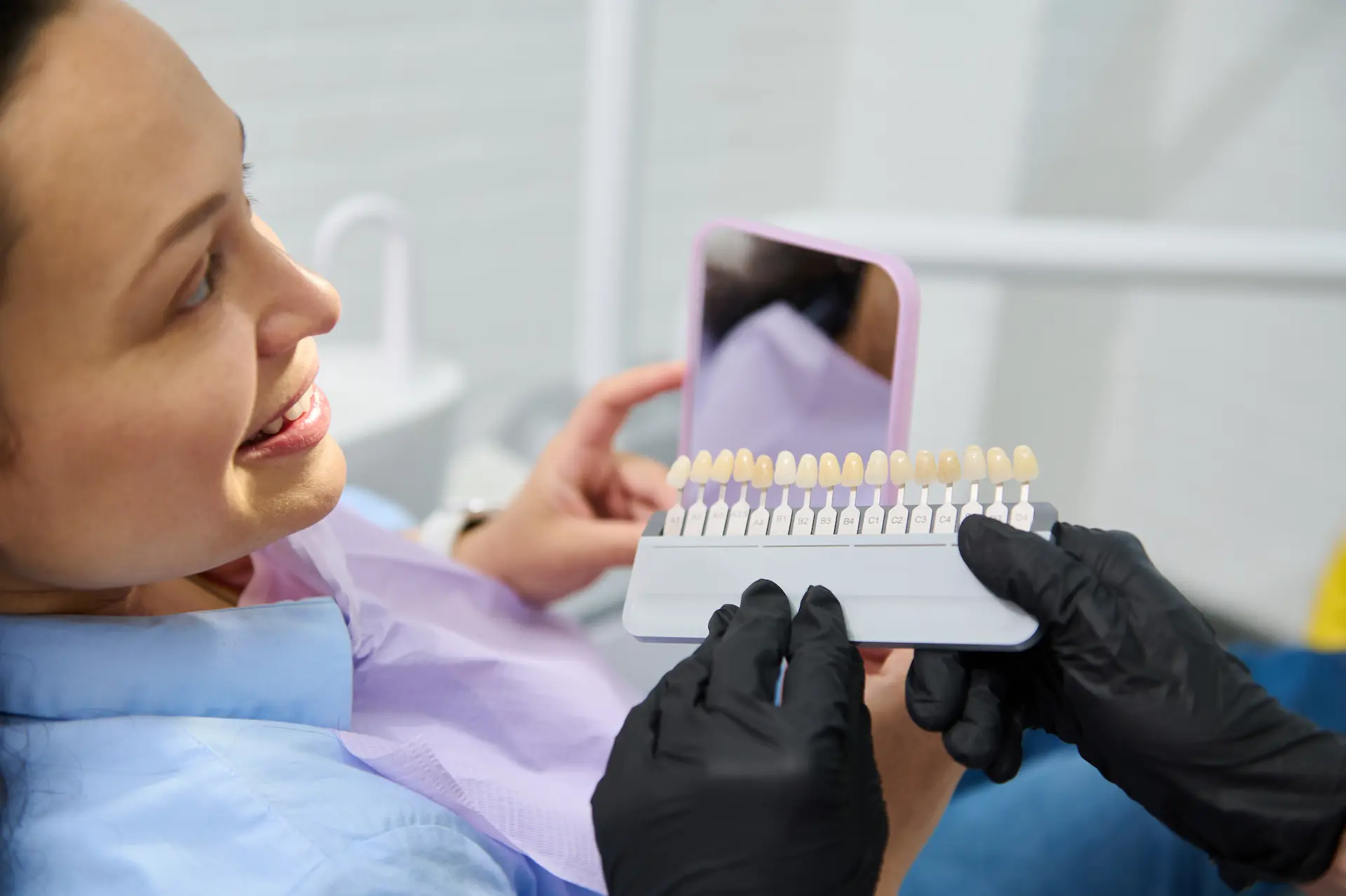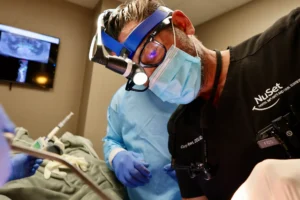Tooth loss is alarmingly common, with a significant percentage of adults aged 34- 45 experiencing it at some stage. This issue highlights the importance of proper tooth replacement to maintain dental alignment, facial structure, and ease of eating and speaking.
Dental implants and bridges are two prevalent solutions. Bridges, often made from porcelain materials, are anchored by adjacent teeth to replace one or several missing teeth. These materials are often made to look and feel like natural teeth.
Dental implants are artificial roots, typically titanium, implanted into the jawbone to support crowns or bridges.
This article will discuss the pros and cons of both options, guiding you in determining the most suitable choice for your needs.
Key Takeaways
- Dental implants are a more permanent, natural-looking solution versus a bridge.
- While bridges may have a smaller initial investment they typically need to be replaced more often than dental implants.
- Implants help preserve the jawbone, while bridges may impact adjacent teeth and do not prevent the jawbone from deteriorating.
- Book a cost-free consultation with NuSet Dental Implants today to determine which option suits your needs.
What are Dental Implants?
Dental implants are an innovative solution for replacing missing teeth. Essentially, they involve a titanium post that is surgically placed into your jawbone, serving as a substitute for the tooth root.
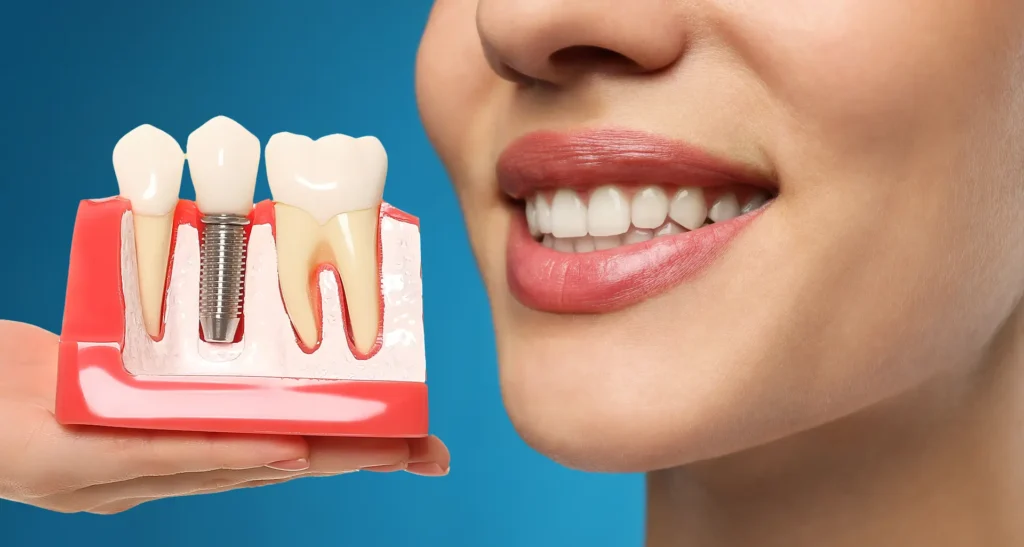
This post then supports a crown or artificial tooth. The benefits of dental implants include their long-lasting nature and high success rates of 97%. They are known for their durability, often lasting for decades with proper care, and they integrate well with the jawbone, helping to maintain its strength and structure. Below are some of the pros and cons of dental implants:
Pros of Dental Implants
- Look and feel like real teeth
- A permanent solution to missing teeth
- They help prevent bone loss.
- Less impact on surrounding teeth.
- Similar to natural teeth in functionality.
Cons of Dental Implants
- Higher upfront cost
- Involves a surgical procedure.
- Requires a recovery period.
- Not suitable for everyone
- Requires good oral hygiene and regular dental visits.
What are Dental Bridges?
Dental bridges are a commonly used solution for filling the gap created by one or more missing teeth. A bridge typically consists of a false tooth, known as a pontic, which is held in place by the adjacent teeth on either side of the gap. These supporting teeth can be natural or capped with crowns.
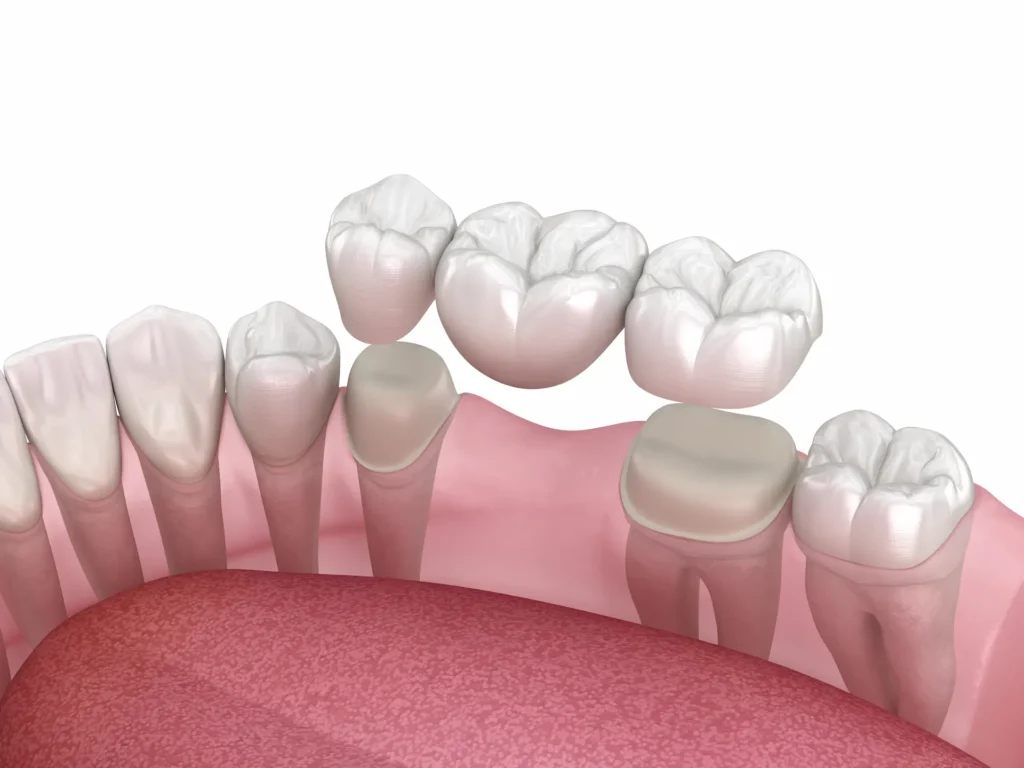
Bridges are usually crafted from materials like porcelain to blend seamlessly with your natural teeth, offering both functional and aesthetic benefits. While they provide a quicker and often more affordable solution than implants, bridges have limitations, such as a shorter lifespan compared to implants and the need for existing healthy teeth for support.
Pros of Bridges
- Bridges are more affordable upfront than implants.
- The process of getting a bridge is faster.
- Doesn’t require surgery, making it less invasive.
Cons of Bridges
- You have to shave down two good teeth next to the missing tooth.
- Bridges are not permanent and typically last 5-15 years.
- It can put a strain on adjacent teeth.
- It may not look or feel as natural as implants.
- Doesn’t prevent jawbone loss like implants do.
Dental Implants vs. Bridges: Key Differences
The key differences between dental implants and bridges are significant. Dental implants are titanium posts surgically placed into the jawbone to replace the roots of missing teeth. They provide a permanent solution, integrating into the bone structure and offering a natural look and feel.
Dental bridges involve creating a false tooth anchored to the surrounding teeth. Unlike the more enduring implants, bridges are typically less invasive to install and more cost-effective but generally last between 5 to 15 years.
| Feature | Dental Implants | Dental Bridges |
|---|---|---|
| Composition | Titanium posts implanted into the jawbone | False tooth anchored to adjacent teeth |
| Nature | Permanent solution to missing teeth | Semi-permanent, lasting 5-15 years |
| Procedure | Surgically placed, requires healing | Less invasive, quicker installation |
| Cost | Higher upfront cost | More cost-effective |
| Impact on Surrounding | Preserves jawbone, no impact | Can stress adjacent teeth |
| Aesthetics & Function | Mimics real teeth, maintains bone | Less natural, may not prevent bone loss |
The Cost Comparison
Cost is a significant factor when considering dental implants and bridges. Dental implants, while offering a more permanent solution, come with a higher price tag. The cost per implant typically ranges between $3,000 and $3,500. For a full set, this can escalate to between $17,500 and $25,000 per arch.
On the other hand, dental bridges are more budget-friendly. According to the American Dental Association (ADA), a bridge to replace a single tooth usually costs around $500 to $1,500. At NuSet, a dental bridge (2 implants and 3 units crowns) costs $9, 000 to $11, 500 depending on your dental needs.
It’s important to consider these financial implications when making your choice, alongside the long-term benefits and drawbacks of each option.
In addition to the initial costs, it’s crucial to consider the long-term financial implications of dental implants and bridges.
While implants have a higher initial cost, their durability means less frequent replacements, potentially making them more cost-effective over time. Conversely, though more affordable upfront, bridges may require replacements or adjustments, leading to additional costs in the long run.
It’s also important to factor in insurance coverage, as some plans may cover a portion of the costs for either procedure. Always consult your dental provider to understand the total investment and any available financial assistance or payment plans.
Implant vs Bridge: How to Choose What’s Right For You
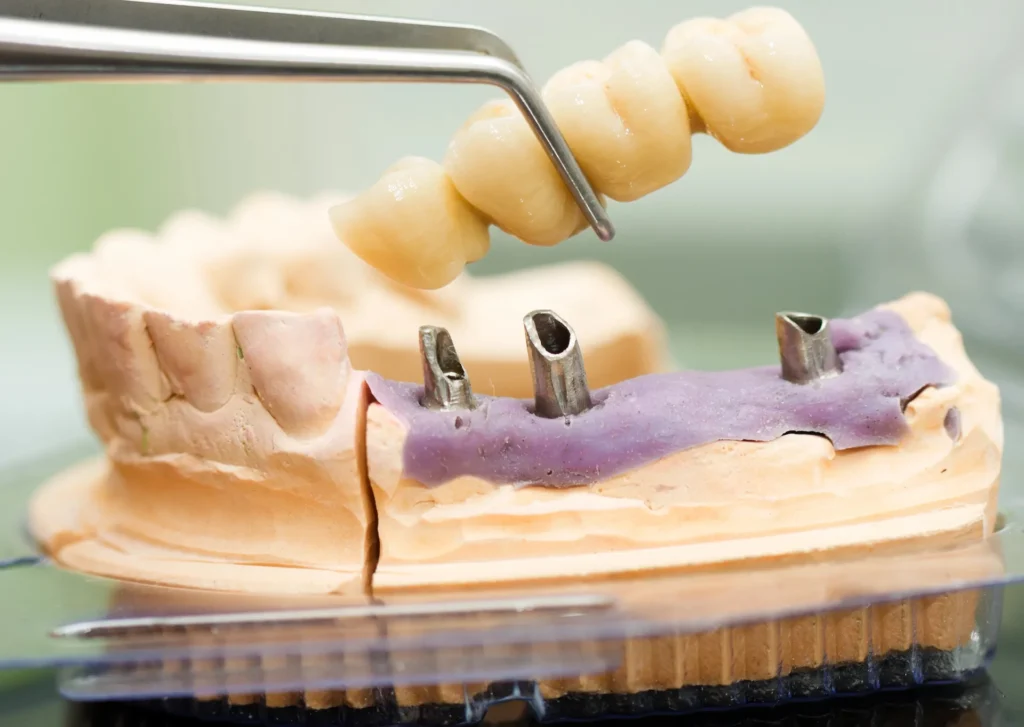
When deciding between dental implants and bridges, it’s essential to consider several key factors:
Oral Health Condition
The state of your gums and remaining teeth can influence the choice. Implants require healthy gums and adequate bone support, while bridges need strong adjacent teeth for support.
Jawbone Density and Quality
Implants need a good bone structure for successful integration. If bone density is an issue, bridges might be the better option.
Long-Term Maintenance and Care
Implants might require less maintenance but need good oral hygiene. Bridges might need replacement or repair over time.
Financial Considerations
Assess your budget, including initial costs and potential future expenses. Insurance coverage can also influence your decision.
Aesthetic Preferences
Consider how important the natural appearance of your teeth is to you. Implants often provide a more natural look.
Lifestyle Factors
Your daily habits, such as eating and speaking, might be better suited to one option over the other.
Time and Convenience
Bridges might be preferable if you seek a quicker solution as they require less placement time than implants.
These factors collectively help determine the most suitable option for tooth replacement, tailored to your specific needs and circumstances.
Other Options (Dentures, Partial Dentures)
In addition to bridges and implants, there are other tooth replacement options like dentures and partial dentures:
Removable Dentures
Removable dentures are suitable for those with significant tooth loss and seeking a more affordable solution. They are less natural in appearance and feel compared to implants and bridges but offer the benefit of being easily removable.
Partial Dentures
Partial dentures are for individuals who have lost a few teeth to help fill specific gaps. They offer a more natural appearance than complete dentures and are typically more affordable than implants. Partial dentures are a good middle ground, providing improved aesthetics and functionality without the higher cost of implants.
Both options offer different benefits, catering to varying needs and budgets, making them worth considering for those seeking alternatives to implants and bridges.
Making an Informed Decision

Consulting a dental professional is a critical step in your decision-making process. They bring expertise and personalized insights, considering factors unique to your dental situation, such as oral health, bone structure, and personal needs.
Additionally, exploring patient testimonials and case studies can provide a deeper understanding of others’ experiences with implants and bridges. These real-life stories can shed light on the practical aspects and outcomes of each option, complementing the information in this article.
Professional guidance is indispensable in making a well-informed choice that suits your circumstances. For expert advice, reach out to specialists at Nuset Dental Implants. This step ensures that your decision is informed by research and professional evaluation and recommendations tailored to you.
Start Your Treatment Plan With NuSet Dental Implants Today!
Initiating your path to better dental health involves consulting with your dentist. At NuSet Dental Implant, we will assess your teeth and gums and discuss replacement options that align with your needs and financial situation. This process might include necessary X-rays or CT scans to see if dental implants or bridges are viable for you.
Taking this step towards getting a dental bridge or implant is key to enhancing your oral health and overall well-being. It’s a proactive move towards a healthier, more confident smile. Book a free consultation with us today to get started!
Frequently Asked Questions
How many teeth can you have on one implant?
A single dental implant can support one or a few teeth. The most common configuration is one implant for one replacement tooth. However, there are scenarios where one implant supports a bridge for multiple teeth. The specific number depends on the patient’s dental structure, bone quality, and prosthetic type. Your dentist will evaluate and advise the best option for your case.
Who is not suitable for dental implants?
Not everyone is a good candidate for dental implants. Those with inadequate jawbone density, which is crucial for implant support, may not be suitable. People with uncontrolled chronic disorders like diabetes or heart disease or who have had radiation therapy to the head or neck area need to be evaluated on an individual basis. Habitual smokers or those with poor oral hygiene might also face complications. A comprehensive dental evaluation is necessary to determine eligibility.
What is the best age to get dental implants?
Generally, dental implants are recommended for adults whose jawbones have stopped growing, typically after the late teenage years. There is no specific ‘best age’ as the decision depends more on individual bone development and oral health status. For older adults, overall health and jawbone condition are key factors. Age itself is not a disqualifying factor, and many elderly individuals successfully receive implants. Your dentist will consider your age, health, and jawbone condition in their assessment.
What dental implant services do you offer?
At NuSet Dental Implants and Oral Surgery, we offer various dental implant services to meet diverse needs and preferences. Each service is tailored to best fit your specific dental situation.
Here’s a look at the various implant services we offer:
- Full mouth dental implants
- All-on-4 Dental Implants
- All-on-5 Dental Implants
- All-on-6 Dental Implants
- All-on-8 Dental Implants
- Snap-On Dental Implants
- Mini Implants
- Zirconia Implants
- Single Arch Implants
- Full Arch Implant Supported Bridge
- Zygomatic Dental Implants
- Same Day Dental Implants
Where can I get dental implants near me?
If you’re searching for “dental implants near me,” NuSet Dental Implants and Oral Surgery has several convenient locations to serve you. Each office is equipped with state-of-the-art technology and staffed by experienced professionals dedicated to providing top-quality dental care.
- NuSet Dental Implants and Oral Surgery of St Louis
- 2821 North Ballas Road #225 St Louis, MO 63131 (Inside Town and Medical Building)
- Get driving directions
- NuSet Dental Implants and Oral Surgery of Scottsdale
- 8800 E. Raintree Dr Suite 170 Scottsdale, AZ 85260
- Get driving directions
- NuSet Dental Implants and Oral Surgery of Nashville
- 5651 Frist Blvd. #300 Hermitage, TN 37076
- Get driving directions
- NuSet Dental Implants and Oral Surgery of Clarksville
- 12431 Clarksville Pike Route 108 Clarksville, MD 21029
- Get driving directions
For personalized care and the highest standard in dental implant services, visit one of our locations. Schedule your appointment today and take the first step towards a healthier, more confident smile.

